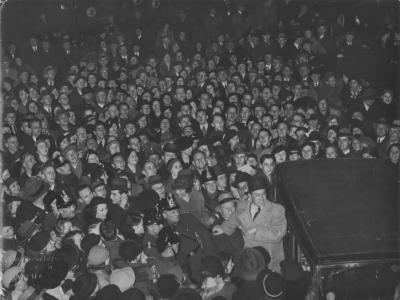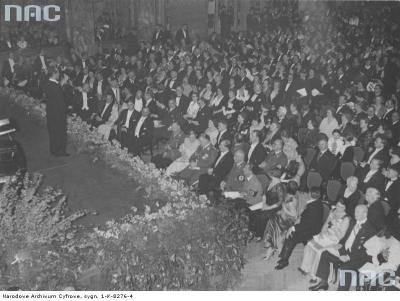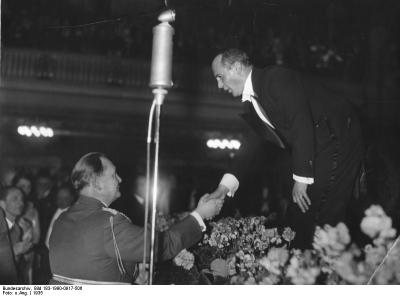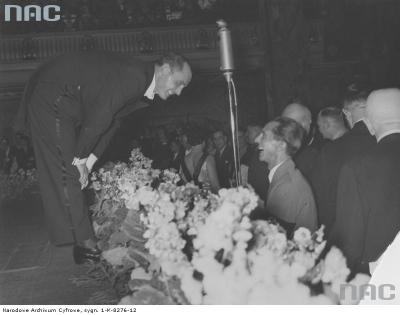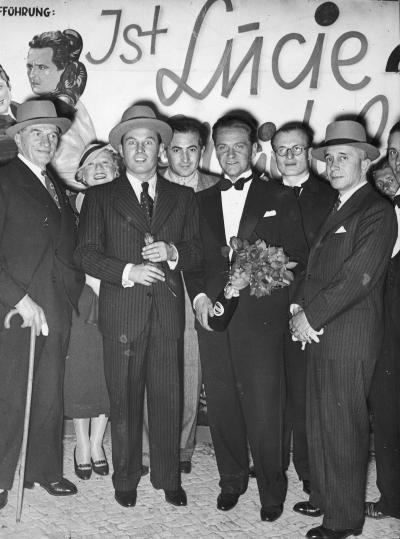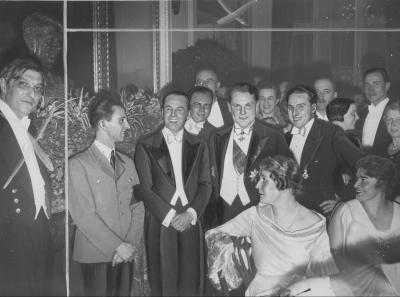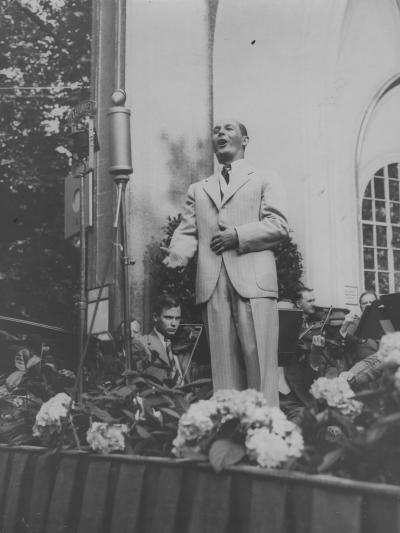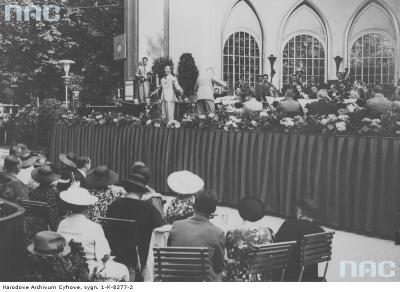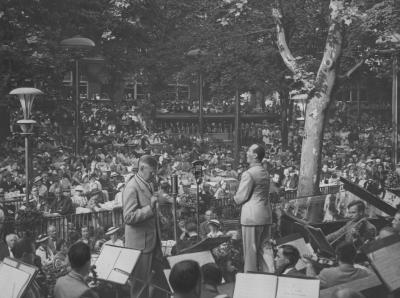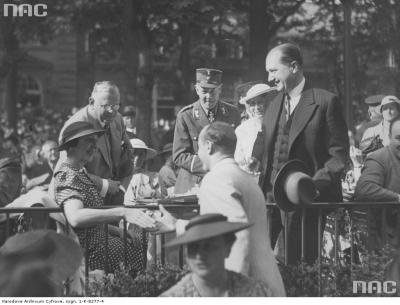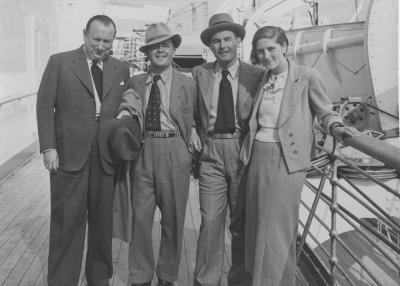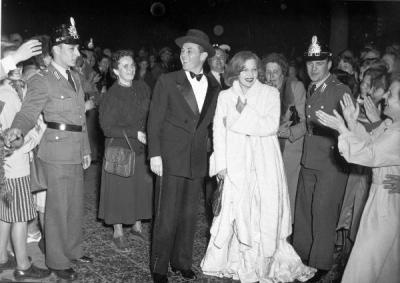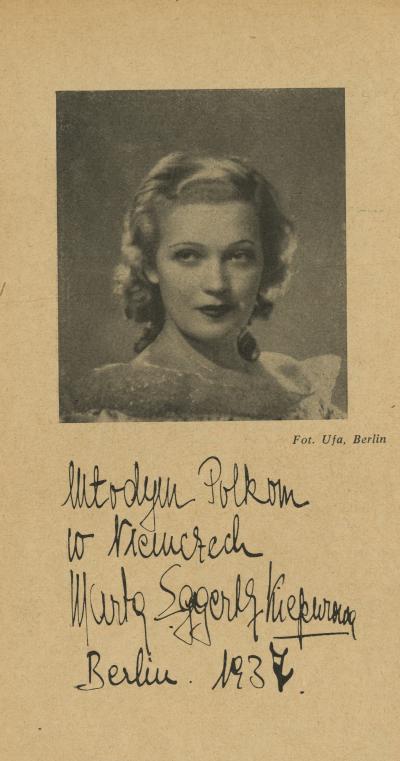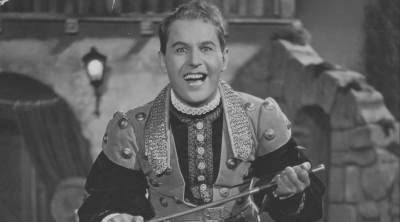Jan Kiepura
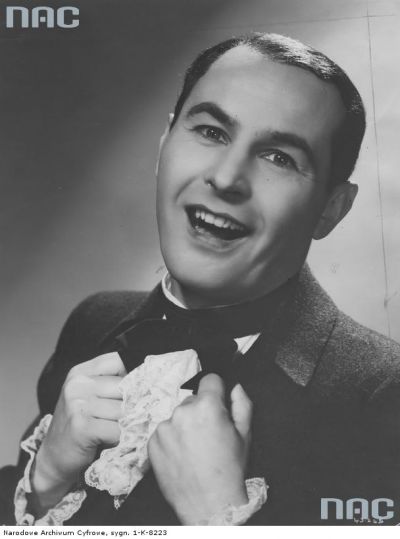
“Ob blond, ob braun, ich liebe alle Frau'n!” (“Blondes, brunettes, I love all women”) When this hit song conquered the streets and courtyards of Germany in 1935 Jan Kiepura was at the peak of a worldwide career. Audiences poured into German cinemas on his account alone.
Jan Wiktor Kiepura was born in 1902 in Sosnowiec, a town that was a part of the Tsarist empire in Russia at the time, but today belongs to Poland. He had a Catholic father (Fanciszek) and a Jewish mother (Miriam). His childhood was spent in less affluent surroundings, mainly between school and work in the family bakery. His musical talent was clear from the start because he loved to sing a lot at home and in school. His early political commitment was also clear: he was a member of the “Polish Military Organisation” (Polska Organizacja Wojskowa / POW) and took part in the First and Second Silesian Uprisings (I i II Powstanie Śląskie). After a lot of hard work Jan Kiepura passed his A-levels in 1921 and immediately began a course in law at Warsaw University, something which corresponded with the wishes of his parents. That said, he failed to complete his studies. At the same time he took lessons in singing from Władysław Brzeziński and Tadeusz Leliwa, something that was definitely against the wishes of his parents. Four years later he began appearing on stage in various Polish towns and cities, including Lwów, Poznań and Warsaw. In 1926 he left Poland for Vienna to embark on an international career. Here, in September 1926 he made a triumphant debut in Puccini’s Tosca in the role of Cavaradossi. Henceforth Jan Kiepura began to conquer the opera world as a leading tenor.
The next great break in his career was in 1930 when he filmed “The Singing City” under the direction of Carmine Gallone. The film was shot in three languages: German, French and English. This was usual at the time. But what was not so usual was the fact that Jan Kiepura sang in all other languages in his films. The film was a triumph and from now on Jan Kiepura dedicated himself to the new “talking movie” medium, without however completely neglecting the stage. He continued to sing in recitals and operas and often appeared in benefit galas. He was also known for his “spontaneous” recitals in front of hotels and on car roofs, everywhere where he was awaited by his huge number of fans.
Jan Kiepura shot more films in Germany in the 1930s. They not only bear witness to his talent as a singer and actor but are still a part of the canon of musical film history. These include “Das Lied einer Nacht” (1932, a German production directed by Anatole Litvak, with additional English and French versions), “Ein Lied für dich” (1933, a German/French production directed by Joe May and Henri-Georges Clouzot, in German and French versions), “Mein Herz ruft nach Dir” (1934, a German production directed by Carmine Gallone, with additional French and English versions), “Ich liebe alle Frauen” (1935, a German/French production directed by Carl Lamac, in German and French versions), “Im Sonnenschein” (1936, a German production directed by Carmine Gallone), and “Zauber der Bohème” (1937, an Austrian production directed by Géza von Bolváry). Interestingly enough, in almost all his films Jan Kiepura sang one song in Polish.
Whilst filming “Mein Herz ruft nach Dir” he met the great Hungarian actress and singer, Marta Eggerth. They were married in 1936 and remained together for the rest of their life. They were regarded as a dream couple and sang together on all the great stages of the world, as well as appearing in the most successful films of the time. Their greatest joint success was the film, “Zauber der Bohème”.
At the end of the 1930s Jan Kiepura made a succession of negative comments about Nazi Germany in the Polish media and, as a result, all the films featuring Kiepura and his wife were banned in Germany in 1938.
The news of the outbreak of World War II on 1 September 1939 reached Marta Eggerth and Jan Kiepura while they were filming the novel “Manon” in France. After a short intermezzo with the Polish army in exile Jan Kiepura decided to move to the USA via the south of France. This could not have been an easy decision for him. He always emphasised his Polish origins and his love of his Polish homeland. Nonetheless Kiepura remained committed to the people of Poland in his own way. He sang at many benefit concerts and collected money for Polish citizens in need. One of the organisations to whom he donated money was the “Fundusz Pomocy Polsce” (Polish Relief Fund). Along with his wife he supported European refugees who had emigrated to the USA. In this way a huge amount of people benefited from their immense aid in difficult times.
In America Jan Kiepura was hired by the Metropolitan Opera in New York. From now on America was his main source of employment. In 1953 he even became an American citizen. Apart from a six-year stay in Paris (1948 - 1954) he lived in the USA. Paris was now his European centre, from which he organised tours of Europe. He was also loved visiting Germany, example the time when he was a star guest at the Berlin Film Festival in 1952. In 1958 Jan Kiepura finally returned to Poland after 19 years. Here he gave 15 recitals, all of which were greeted with standing ovations from huge enthusiastic audiences. This was important both for him and his fans, for communist propaganda continually tried to discredit Jan Kiepura as a traitor to his fatherland.
Even though Jan Kiepura mostly worked in films he remained a successful opera singer for the rest of his life. In June 1966 he signed a new contract with the Metropolitan Opera in New York, but two months later on 15th August he died of a heart attack in his house in Harrison (USA). His funeral took place in Warsaw. 100,000 people lined the streets on the way to his grave in the most famous cemetery in Warsaw,“Powązki”.
Adam Gusowski, March 2016
Table of his career:
16.05.1902 Born in Sosnowiec
1912 - 1916 Business school (His education was interrupted by the First World War)
1916 Member of the secret Polish Military Organisation (Polska Organisacja Wojskowa)
1916 Member of the Free School for Officer Cadets (Wolna Szkoła Podchorążych)
1919 Member of the I. Beuthen Artillery Battalion (I pułk Strzelców Bytomskich)
1919 Takes part in the First Silesian uprising (He was wounded and returned home)
1920 Takes part in the Second Silesian uprising
1920 Returns from the front
1921 A-levels in Sosnowiec
1921 Starts a course of law at Warsaw University
1921 Begins singing lessons under Prof. Wacław Brzeziński
1924 Engaged in the choir of the Warsaw Opera
1924 Exmatriculated from his course of law at Warsaw University
1925 First public appearances in Lemberg, Poznan and Warsaw
1926 Engagements in Vienna, later Paris and Milan
1927 Recitals in Kraków, Warsaw and Breslau
1930 - 1937 Various films in Germany
1936 Marries the actress and singer, Marta Eggerth
1938 Engaged by the Metropolitan Opera in New York
1940 Emigrates to America
1953 American citizenship
1948 - 1954 Lives in Paris, appearances all over Europe
1965 Guest appearances in Cologne and West Berlin (The Merry Widow)
1966 15th August. Jan Kiepura dies as a result of a heart attack in Harrison (New York)
Additional information:
In 1935 Jan Kiepura gave a recital at the opening of the German-Polish Institute at the Lessing College in Berlin. Joseph Goebbels applauded him from the first row of the audience and directly after the performance he was given a hearty handshake by the Reichsminister Hermann Göring. In the 1930s there were no limits to Germans’ enthusiasm for Jan Kiepura, both amongst the folk and those in power. This changed dramatically shortly before the start of the Second World War.
The Viennese were always enthusiastic fans of Jan Kiepura, and have remembered him with gratitude in their own particular way. One of the streets in the 14th district of Vienna (Hütteldorf) was named “Jan-Kiepura-Gasse” on 12th May 1975
One of the European night express trains run by Polish Railways from Warsaw to Amsterdam via Germany, is called “Jan Kiepura”.
